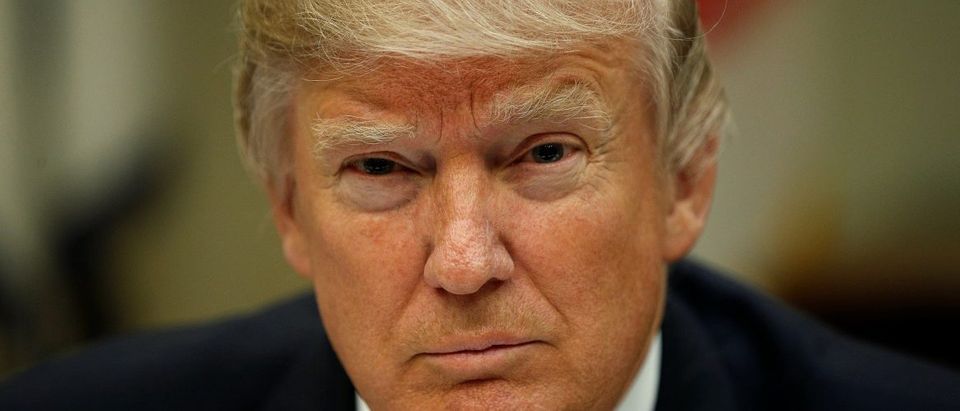The FBI reportedly agreed to pay the creator of the Trump dossier and then reneged on its promise, which, according to one former high-level agency official, may have been because the creator engaged in double-dealing and produced biased research.
The Washington Post reported Tuesday that the FBI had verbally agreed to pay former MI6 agent Christopher Steele to continue work on his dossier regarding allegations the Russians had compromising information on President Donald Trump’s sexual activities.
This agreement was struck at the same time Steele was still receiving payment from Clinton supporters for his opposition research, but communication lines between the bureau and Steele were abruptly severed after the dossier leaked to the media and became a dominating story in the news cycle, drawing heated denials from Trump and launching various congressional inquiries.
Ron Hosko, former FBI assistant director, who worked for FBI Director James Comey until 2014, told The Daily Caller News Foundation that partisanship and double-dealing are two considerations agents closely examine when vetting sources for intelligence.
“The potential for bias and double-dealing is one that’s real and one that the FBI agents and their bosses need to be guarding against,” Hosko told TheDCNF. “And it could be that they had some conversations and they determined, “Well they this guy is playing these cards all over town, let’s pull away from it,” or “this is riddled with bad information, they’ve mis-characterized it, they’ve overstated it” – all of these things are a risk that the FBI is looking for and will result in termination of a relationship.”
“So, it could be that the Bureau had worked with the source before or the source was referred to the Bureau as having intel of value and they had some preliminary or early discussions on compensation but perhaps something changed,” Hosko said. “That something could easily be someone higher in the chain of command who said ‘hold on – something isn’t right’ and they decided against a payment.”
“Frankly, that’s the expectation of the chain of command – that they too are managing the FBI’s equities and looking past what a line agent sees (trying to build the relationship/trusting the source perhaps a bit too much) and hitting the brakes because something is off track.”
In fact, Hosko said that not only does the FBI take seriously evidence of double-dealing, the agency even scrutinizes sources to see if they have any prior agreements with other law enforcement agencies before pursuing financial arrangements with sources.
“Unless there’s an agreement to run a source jointly, that’s perilous,” Hosko added.
Moreover, Hosko said the agency would have been concerned about any built-in bias inherent in a partisan research effort.
“As managers and executives, you’re looking for straightforward intelligence, straight-up information of value. Human sources are vital to the success of the organization, but you always have to be careful about what’s motivating that. Is it the money? They’ll tell you anything for money.”
Steele had previously worked with the FBI and reached out to the agency as his contract and funding from a pro-Hillary PAC was about to dry up. As a result, Steele and the FBI came to an agreement that he would be compensated for continued research.
According to Hosko, the fact that the FBI was willing to pay for the information doesn’t necessarily mean the agency believed Steele’s research to be credible.
“Just because they handed you a report and you may be willing to pay some money for it—doesn’t mean you accept the report at face-value,” Hosko said. “It could be that the bureau was willing to pay for a report to compare it against its intelligence collection.”
As the election date grew closer, Steele became increasingly upset with the FBI after Comey announced a new Clinton email investigation just more than a week before the election.
Moreover, Steele’s frustration compounded after an Oct. 31 article in The New York Times reported the FBI had not turned up any “conclusive or direct link” between Trump and Moscow. That article also stated the FBI did not believe Russian hacking on U.S. political institutions was intended to support Trump, a conclusion the agency later changed.
The FBI and top intelligence officials briefed Trump on the allegations in Steele’s dossier in early January, partly to let Trump know that the document had been making the rounds among members of Congress and various intelligence agencies.
On Jan. 10, BuzzFeed decided to publish the full dossier and stated that the document had already been seen by numerous journalists, lawmakers and intelligence officials for months.
Once news of the briefing hit the media, the FBI severed its communication with Steele, refusing to pay him for his dossier.
Follow Jonah Bennett on Twitter
Send tips to jonah@dailycallernewsfoundation.org.
All content created by the Daily Caller News Foundation, an independent and nonpartisan newswire service, is available without charge to any legitimate news publisher that can provide a large audience. All republished articles must include our logo, our reporter’s byline and their DCNF affiliation. For any questions about our guidelines or partnering with us, please contact licensing@dailycallernewsfoundation.org.


